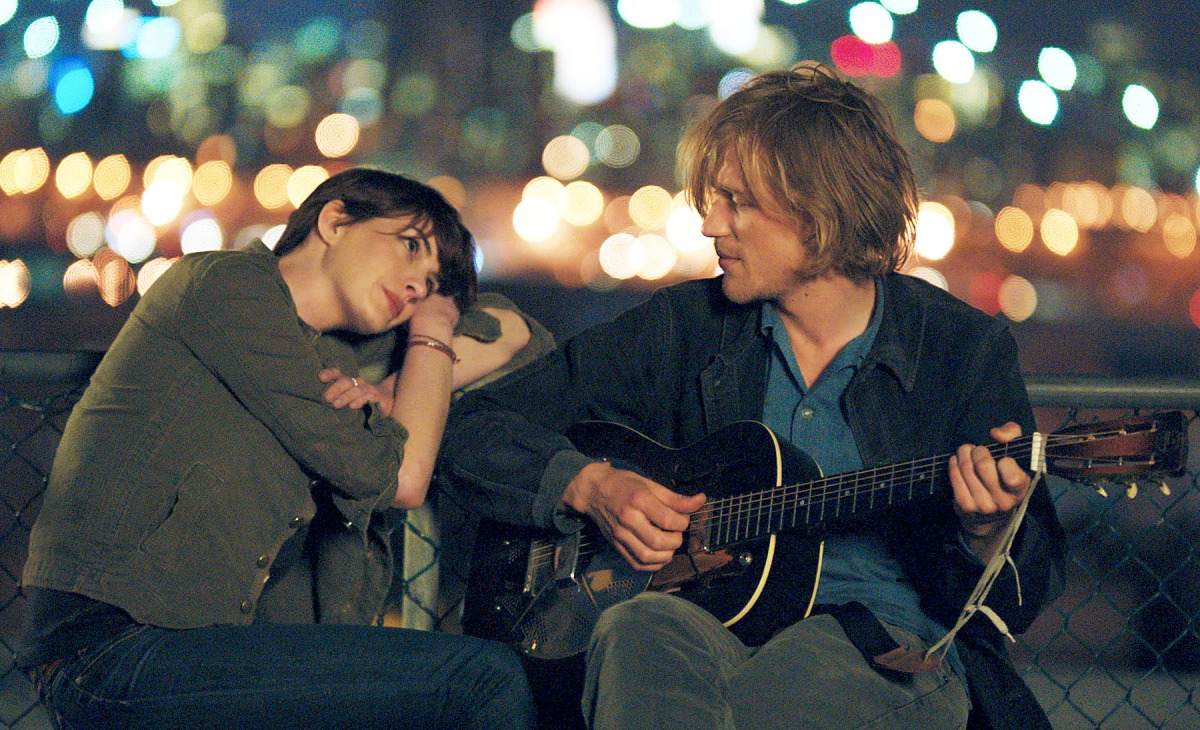Written & Directed by Kate Barker-Froyland
The modern movie musical has taken some interesting and really good turns in the past decade or so. Hollywood doesn’t utilize the triple threats like Gene Kelly and Fred Astaire anymore, so when a musical comes around, it’s much more rare. It’s rarer still that a true musical is anywhere near as good as the likes of Singin’ in the Rain or Top Hat. So instead of the sing and dance routine, we’ve been treated to music-centric films like Almost Famous, Once, and Begin Again, movies with music at the core of what they’re doing and what they’re about, but also much less about organized musical numbers. With her debut film, Kate Barker-Froyland is attempting to hit that connective note of music that has made other modern musicals before it so successful.
Henry (Ben Rosenfield) is a young musician trying to make it on the streets of New York City, but one night he gets struck by a cab and falls into a coma. His sister Franny (Anne Hathaway) must come from halfway around the world to be by his side as she contemplates the argument with Henry on which they left off months ago. After she finds a ticket for the show in Henry’s diary, Franny decides to attend the concert of James Forester (Johnny Flynn), Henry’s favorite artist who happens to also be going through a songwriting crisis. Through his diary, Franny begins to trace Henry’s steps and learn who he is. When Forester strikes a liking to Franny after the concert, the two begin to explore the musical inspiration that leads to love and expression, both hoping to find something worth hanging on to, both musically and emotionally,
The songs, composed by indie darlings Jenny Lewis and Johnathan Rice, are the film’s highest point. They are not only catchy tunes, but central to the communication of the emotion of the characters. Another high point is Barker-Froyland’s restraint with the characters. She never gives them too much or too big a scene, and that subtlety can often go a long way in presenting a world of authentic interaction. This restraint, however, is almost too overplayed, resulting in broad strokes and not enough acting chops from the cast to make up for the unspoken parts of the film. Flynn’s awkward James Forester seems more empty than he does mysterious and Hathaway’s Franny more lost and wandering than searching for answers. There is too much space left in the script to hit any strong points home. Instead we only get fleeting ideas.
Barker-Froyland turns out to be a much more accomplished director in her debut than a screenwriter. To her credit, the staging and execution of the scenes makes the film visually interesting, but the dialogue and scenarios do the cast no favors. For a film about a grieving sister, we certainly didn’t get much time to discover or learn about Henry, which creates an issue with sympathy towards Franny. She was wandering and searching for answers, but to what questions and to what end? Why is she getting her Ph.D. in anthropology? The film wants to be a about Franny finding out who she is, by finding out who her brother is, but in the end I still don’t know anything about either because there is never quite enough to go on.
There is good intention behind this film. Barker-Froyland is toying with some really interesting ideas, but never gets them fully developed to really connect. And while the songs are a great part of the film, their problem is that they become a crutch on which the rest of the movie stands. For as powerful and brilliant as the songs may be, the rest of the film is full of tepid moments of half-authentic emotions. Song One could have benefited from a longer runtime to expand on its ideas, to give the characters, and the actors for that matter, more of an opportunity to tell us their story. Sadly we only get to see the Cliff Notes version of their lives, which may be enough to understand the surface, but the heart of a story rarely resides on its surface.
**1/2 – Average

